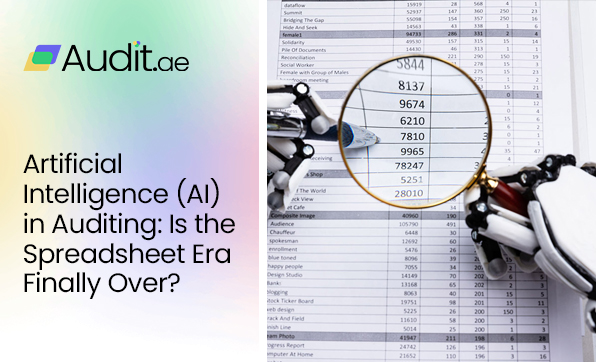
More than 21% of organizations within the UAE have followed Artificial Intelligence (AI) in recent years, which has caused an extensive growth in the integration of AI technology in numerous areas of the country. Dubai Chambers highlighted this speedy growth from 7% to 21% in only 3 years; the country’s strategic emphasis on innovation and virtual alternatives is revealed. This growth is obvious mainly in industries that include cyber security, logistics, and healthcare, wherein AI is actively shaping operations. In addition, the main price with predominant corporations, which include Deloitte, AI has an effect on is now increasing in regions that include auditing, a signal of a transformational alternative in conventional enterprise practices.
With this shift, it is truthful to invite the question: are we eventually transferring beyond the spreadsheet era?
Is AI the Future of Auditing?
As AI becomes more mainstream, most regions are consideration its integration into their systems to enhance workflow and efficiency. In the auditing field, both internal and external audit can benefit from AI to streamline their procedures. While AI isn’t always predicted to alternate the human auditors completely, it is consider as a useful tool for automation and data evaluation, allowing extensive evaluation and perception to human experts.
Here’s how artificial intelligence may be incorporated into the audit method:
- Planning: AI may be used to discover discrepancies in large datasets, making risk evaluation a great deal quicker.
- Journal Entry Testing: While the overall audit method entails sampling some magazine entries, AI in auditing can without difficulty take a look at all of the entries and flag irregularities.
- Reconciliation: Tools like DataSnipper can automatically match and take a look at documents mechanically in Excel. This saves auditors huge quantities of time and minimizes human error.
- Real-time indicators: AI tools can send alerts when patterns shift or whilst something appears off, giving auditors to respond quickly.
Benefits of Artificial Intelligence in Auditing
Detecting fraud early: AI structures can quickly pick out uncommon or suspicious conduct throughout huge fact sets. With this method auditors can seize troubles sooner.
Reduction in guide mistakes: AI can lessen the danger of human errors with the aid of automating repetitive and certain tasks.
Review complete datasets: AI permits the assessment of all transactions, now no longer simply a particular sample. This reduces the hazard of lacking mistakes or fraud.
More cognizance on evaluation & interpretation: Auditors can spend much less time on habitual paintings and more time studying outcomes and imparting insights.
Regulatory compliance: In the UAE, wherein data privacy legal guidelines, just like the Protection of Data Privacy Law (PDPL), are in place, AI can assist corporations in holding more data and observing rules. However, that is simplest and feasible as soon as there’s greater readability around AI governance.
Challenges in Implementing AI in Auditing
While AI gives many benefits, adopting it in audit practices additionally comes with some challenges:
- Lack of Clear rules: The guidelines round AI are nonetheless growing. While legal guidelines, just like the UAE’s PDPL, offer a few structures, particular guidelines around using AI in auditing are nonetheless being added.
- Algorithm bias: AI system can sometimes produce biased effects or outcomes, which are tough to explain. Auditors want to often assess those outputs to ensure fairness.
- High education investment: If audit corporations in Dubai intend to put AI into force in their method, they want to spend money on the right education for their auditors. This won’t be feasible for smaller corporations.
- Data’ privacy risk: When operating with private or touchy data, auditors ought to observe strict private legal guidelines and ensure data are stored, used, and guarded properly.
- Skill gap for auditors: If AI is a part of the destiny of auditing, organizations ought to upskill their auditors to ensure they have got the essential competencies to address the integration.
How Can Auditors Upskill for the AI Era?
With artificial intelligence in auditing turning more common, auditors want to discover ways to work with it. These are some approaches auditors can use to upskill themselves:
- Awareness of AI trends: Stay up-to-date on trends in local AI rules and auditing standards.
- Basic data analytics knowledge: Understand how AI approaches huge datasets and identifies risks.
- Familiarity with AI audit tools: Explore platforms which might be being utilized by huge auditing corporations.
- Develop Soft skills: As artificial intelligence in audit handles repetitive tasks, auditors will want to focus more on evaluation, interpretation, and reporting.
UAE’s Data Privacy Laws & AI in Auditing
With AI adoption in auditing increasing, data privacy has become more critical. The UAE introduced the Personal Data Protection Law (PDPL) in 2021 to safeguard personal information.
Key provisions include:
- Companies must obtain permission before using personal data.
- People have the right to access and update their information.
- There are guidelines for sharing data outside the UAE.
If auditors use AI, those tools must also comply with PDPL requirements. As both AI governance and privacy regulations evolves, businesses must stay informed to remain compliant.
Work With Expert Auditors From Audit.ae
Audit.ae affords professional audit services in Dubai for customers all throughout the UAE. We have residence for each inner and outside auditor who carries out thorough, independent audits and might assist in streamlining corporation operations and making local and worldwide reporting compliance.
FAQs
Will AI replace auditors?
No, AI will assist auditors by automating tasks while humans focus on analysis and reporting.
How is AI used in auditing?
AI analyzes large datasets, detects anomalies, automates testing, and provides real-time alerts.
What are the benefits of AI in auditing?
It reduces errors, speeds processes, detects fraud early, and ensures better compliance.
Is AI in auditing regulated in the UAE?
Not fully yet—laws like the PDPL apply, but specific AI audit regulations are still evolving.








